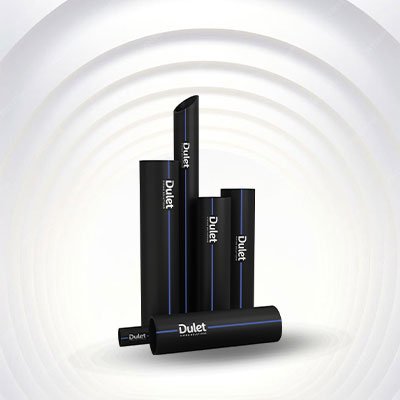HDPE pipes are utilized in many industries and applications because of their strength, flexibility, and durability. Some of the most prevalent HDPE pipe uses include:
1. Water Supply Systems
HDPE pipe for water supply is among the most prevalent applications of HDPE pipe. Because they resist corrosion, can stand high water pressure, and have a long lifespan, they are best suited for municipal water systems, rural water supply systems, and domestic water distribution networks.
In water supply systems, HDPE pipes are employed to transport clean water from treatment plants to households, industries, and other establishments. Because the pipes are resistant to corrosion and scale formation, they provide a clean, safe, and efficient means of conveying drinking water.
2. Sewerage and Drainage Systems
HDPE sewerage pipe is widely used to carry sewage and wastewater. Their chemical resistance and smooth surface make them very effective for carrying waste materials without clogging and deteriorating with time.
Apart from their applications in sewerage networks, HDPE pipes are also applied to stormwater drainage. They have the capability to withstand the pressure of high-flow drainage systems and are extremely resistant to the accumulation of debris.
3. Gas Distribution
HDPE pipes and fittings are widely employed in the gas sector to transport natural gas and other gases. Chemical resistance, flexibility, and strength of HDPE pipes make them the perfect material for underground gas pipelines. HDPE pipes are also utilized in gas distribution systems to transport gas safely and leak-proof to homes and industries.
4. Irrigation farming
HDPE pipes are widely used for agricultural irrigation systems, especially in drippers and sprinkler systems. HDPE irrigation pipe is the choice because it is durable, strong, and can withstand high pressures, which are of prime importance for efficient water distribution in farms and fields. These pipes minimize wastage of water and maximize the efficiency of water distribution, and crops receive optimal water for healthy growth.
5. Cable Protection
Another key application of HDPE pipes is in the protection of underground cables, such as fiber optic cable, electric cable, and telecommunication cable. HDPE flexible pipe is a common application in trenchless installation for cable protection against physical damage and environmental factors.
HDPE pipes are also very flexible and environmentally stress-resistance, making them a great fit for underground cable protection.
6. Industrial Fluid Transport
HDPE pipes are applied in industries to convey chemicals, liquids, and gases of varying natures. HDPE pipes are resistant to chemicals, alkalis, and acids and can be applied in chemical plants, refineries, among other industrial facilities.
Their corrosion resistance guarantees that the carried substances do not degrade the pipes, leading to efficient and safe operations.
7. Marine and Underwater Applications
Due to their buoyancy, resistance to saltwater corrosion, and capacity to endure high-pressure conditions, HDPE pipes are also utilized for marine purposes. Undersea cable protection, offshore drilling, and subaqueous pipeline systems utilize them.

















